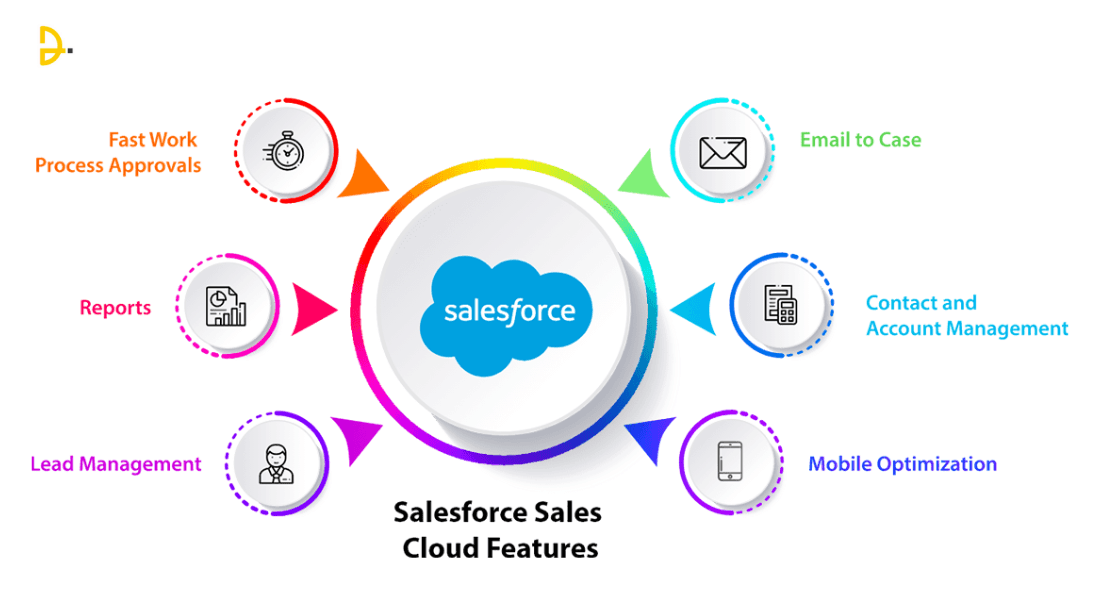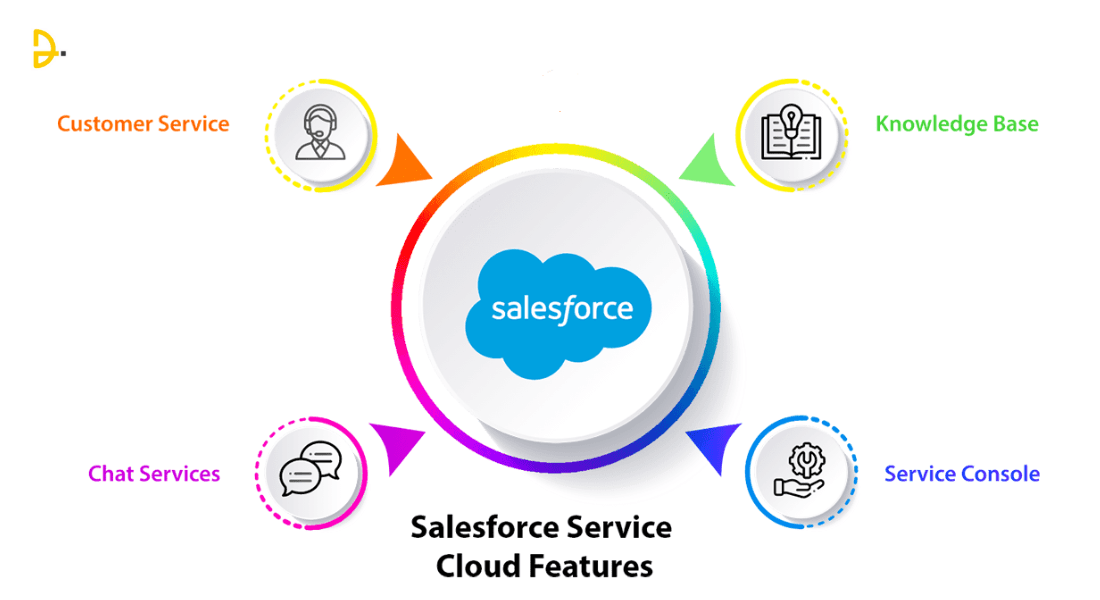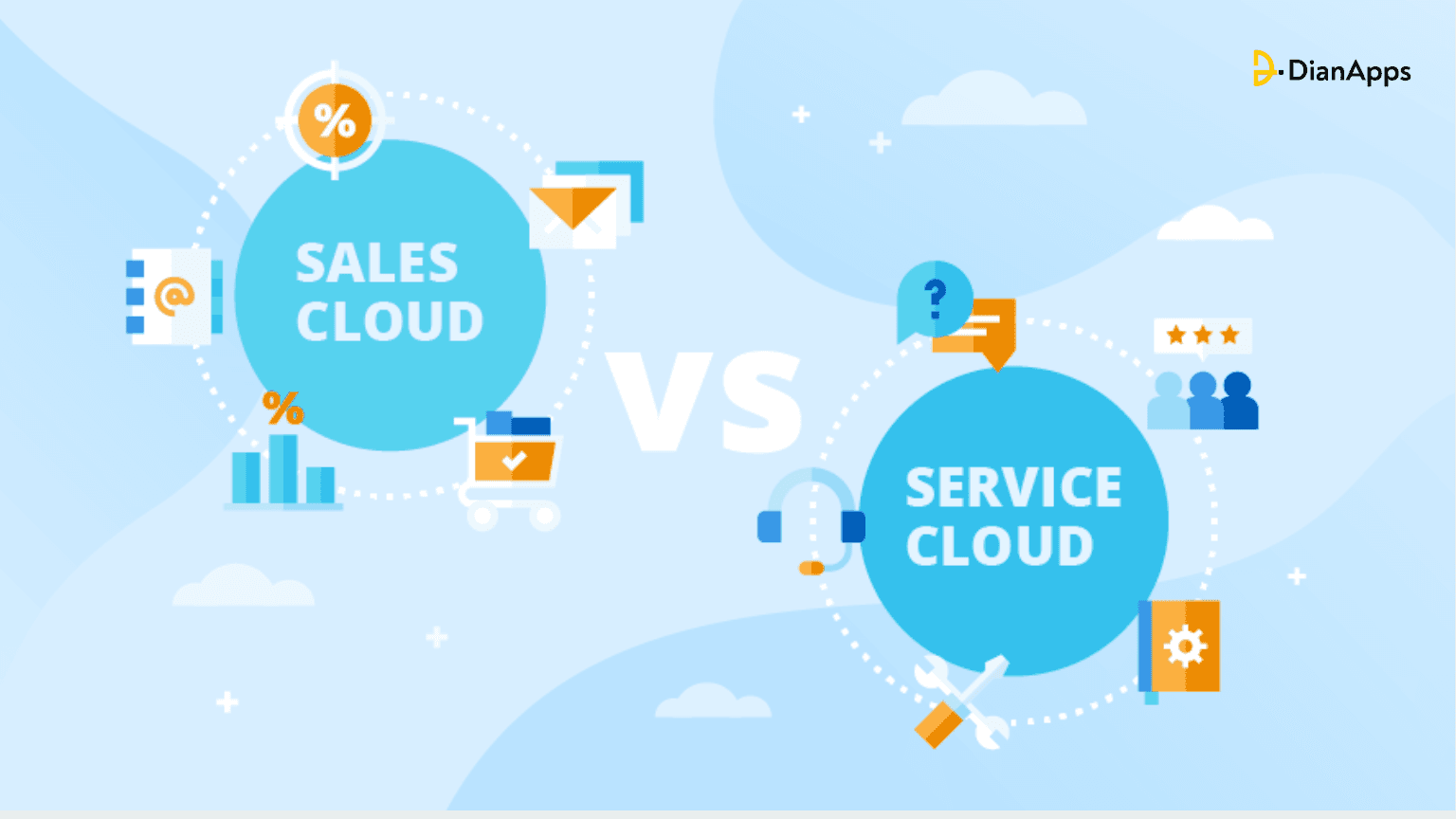Salesforce Partner is a long existed CRM software that companies have been leveraging in their business operations. Although this, we often get confused about which Salesforce tool fits the best in the organization. Is it Salesforce Sales Cloud or Service Cloud? Both are essential parts of elevating sales, services, and cases in any business, therefore, knowing the key differences between the sales cloud and the service cloud might help you in generating valuable leads while creating opportunities to sell products more efficiently.
Not to forget mentioning, there are countable similarities between the two modules as well which we will later discuss in the blog. To start off let’s first understand the concept of what Sales Cloud and Service Cloud are and also look at the key features they offer to the platform.
In a nutshell, this comparison guide will help you in knowing how to choose Salesforce consulting partner at its core. So, without further ado, let’s begin.
What is Salesforce Sales Cloud?
One of the main Salesforce products is Sales Cloud. It is well-made for management, automation, and sales analysis procedures. This implies that Salesforce Sales Cloud is accessible to both sales managers and salespeople. It will enable them to successfully complete activities with high skill levels and unique priorities.
Sales Cloud helps in creating plans for the convenience of the sales managers. This makes it easier to manage it within a single system. It also helps them evaluate and keep track of their sales representatives. Performance data allows managers to identify a sales representative’s strengths and limitations. They can improve the efficiency of the entire sales department by enabling managers to handle several difficulties with ease when they use Sales Cloud. These difficulties include integrating sales cloud and marketing activities with separate business processes.
Salesforce Sales Cloud has several advantages for sales representatives. Through a variety of mediums, it enables organized, easy, and systematic consumer communication. With Progressive adoption, a tonne of contact and account information is gathered. The customer’s website and social media are used for this deployment. It helps them to target their needs clearly and correctly. Large-scale automation capabilities help sales representatives with a number of repetitive activities. This entails controlling price information, keeping track of clients, and creating contracts. This frees up a significant amount of valuable time to close sales and develop leads.
Salesforce Sales Cloud Features:

Sales Cloud’s features include:
a. Lead Management:
Lead management is a breeze with Sales Cloud, making it simple to keep track of all of your precious leads. Even better, you may control them by tailoring the campaigns. Overall, it increases sales and targets clients’ attention in a very specific way.
b. Reports:
Companies may track their reports using the Sales Cloud. This aids them in determining the strengths and weaknesses of the company. Additionally, the company may access the dashboard or reports from any location at any time.
c. Fast Work Process Approvals:
Organizations may simply create rapid plans with visual workflow. They all have quick confirmation processes for purchases, discounts, and outlays.
d. Email to Case:
This is often an automated response that, depending on the characteristics of the record, sends emails to case entries automatically.
e. Management of Contacts and Accounts:
Management is managed and regulated by Sales Cloud. Some of these include contacts for business, customer communications, and several other elements.
f. Mobile Optimization:
Your phone should ideally function as a little office administration gateway. You may control call logs, examine reports, and see job prospects. Even additional options include managing leads and switching between dashboards.
What is Service Cloud?
Users claim that the Salesforce Service Cloud adaptation has greatly aided them. They can now efficiently and quickly serve consumers. It is well-recognized that keeping current clients is far better and simpler than finding new ones. Service Cloud may therefore prove to be a crucial tool for your business. Managers of customer service claim that it has a beneficial effect on client retention. As a result, it guarantees that your business is recognized for putting consumers first!
For service agents, Salesforce Service Cloud services allow integration with several client communication channels. These customer care representatives can help clients more quickly. Each route of communication is available through the Service Cloud UI. Service Cloud also makes it possible to create and manage knowledge bases. These are really helpful sources and ways to get commonly asked-for information.
You can quickly cut down on the time it takes agents to respond with such a comprehensive knowledge base. The new service representatives are then quickly trained. In actuality, customer care representatives resolve their situations more quickly, easily, and efficiently. Only Service Cloud’s CS process automation makes this feasible.
The possibility for organizing and managing simple customer service is provided by Service Cloud. With Service Cloud, customer service managers have control over the performance of customer service reps; this further aids in arranging training, identifying the area of employee growth, etc. It processes and manages them without any Service Cloud UI.
Salesforce Service Cloud Features:

Sales Cloud consultants offer numerous capabilities and activities included in the Service Cloud. It is therefore a perfect and unique module.
Several important aspects of Service Cloud are as follows:
1. Chat services:
Chat services are offered by live chat assistants through the Service Cloud. This service provides online customer support for goods and services.
2. Customer service:
Service Cloud offers outstanding customer services on a single social platform. What’s best? No extra websites are required for customers to visit.
3. Knowledge Base:
The agents benefit from the knowledge base that Service Cloud builds. As the agents receive their responses swiftly, an improved issue resolution is introduced.
4. Service Console:
It aids in handling all critical instances by having a professional manage all tasks. This makes it possible for the clients to correctly profit from the services you offer.
It won’t be fair if we don’t compare both the Salesforce modules together. So, let’s find the comparison below!
Sales Cloud vs Service Cloud: Feature Comparison
Sales Cloud and Service Cloud overlap or flap each other significantly. It does not imply that the two CRM software products are identical or comparable, though.
We advise customers from sales-focused companies to use Sales Cloud. This is due to the qualities that Sales Cloud has that allow a lead to become an accountant.
To that end, a few distinctive Sales Cloud features are as follows:
- Sales Agreements
- Forecasting Sales
- Managing Territories
- Obtaining Quotes
- Opportunity Splitting
Take, for instance, helpful Sales Cloud add-ons like CPQ. Any of the defined or provided items may be quoted precisely and without mistake using CPQ. It should, nevertheless, adhere to the laws. A Service Cloud license should prevent access to such rules.
Advanced and modern customer service management solutions are available through Service Cloud. Additionally, it improves agent productivity. For this reason, I advise using this Salesforce function in service-oriented firms. Among the special Salesforce Service Cloud are,
- Console for Services (unified digital workspace of agents)
- Customer Analytics (complicated analytics of agent performance)
- A tool for planning/assembling on-site client visits or excursions is called “field service.”
Difference between Salesforce Sales Cloud vs Service Cloud
Getting leads and turning them into concluded transactions are both possible when you utilize Sales Cloud. You may call for new opportunities, order campaigns, and manage the ones you already have. You may accomplish superior market forecasting using Sales Cloud. Along with keeping good client relations, you make room for your company to expand.
Service Cloud has a stronger focus on the post-sale phase. It aims to solve all the problems more quickly. When the Salesforce Service Cloud is properly deployed, the client experience is improved. Additionally, you may automate all the service operations and streamline workflows. Additionally, you may assist customer service representatives directly.
The best goal is to promote one-on-one interactions with each person or client. These interactions occur over a variety of pathways. Additionally, Service Cloud secures all of the private data stored on the cloud platform. Additionally, tracking reports help in identifying the gaps in company procedures. As a result, they correct problems and raise total sales.
Sales Cloud vs Service Cloud: Licensing
Sales Cloud service has a companion product called Service Cloud. Milestones and Entitlements are features included in the Service Cloud. On the other hand, Email-to-Case and Cases are part of the Sales Cloud. At its core, Service Cloud is an omnichannel technology.
The Service Cloud differs from the Sales Cloud in that the console is an additional component that is linked to it. Users of this terminal can access many help desk tickets at once. You automatically receive the Sales cloud capabilities with the Salesforce Service Cloud price.
These differences have led many firms to make initial investments in both Service Cloud and Sales Cloud. Instead of being licensed together with Service Cloud, Sales Cloud is licensed separately. Any similarities between the two products run the risk of confusing users regarding licensing.
Sales Cloud + Service Cloud Package
I strongly advise choosing the Sales+Service bundle if you have full-fledged sales and customer service, divisions.
Why is this: This option’s main advantage is that both departments may participate and use a standard and shared costume basis. However, compared to buying Service Cloud and Sales Cloud separately, the cost of the Sales+Service bundle is around $25 higher for each user.
On the other hand, if your company operates both customer service and sales teams, there is a good probability that executives will be persuaded to use Service Cloud for both teams because of how much it overlaps with Sales Cloud.
We do not, however, advise you to choose Service Cloud as the best alternative for the Sales division.
Why is this: When a company or organization is primarily focused on delivering customer service or is customer-oriented, choosing Service Cloud will only make sense in the rarest of circumstances. In these cases, the sales team won’t need any of the extra capabilities or add-ons available in the Sales Cloud.
When Should you choose Sale Cloud vs Service Cloud?
As is common knowledge, customer-focused companies must choose Service Cloud. Businesses that focus on sales, on the other hand, ought to use Sales Cloud. But the story doesn’t end here.
You are well aware of your needs as a member of your organization and you invest your money accordingly. In conclusion, Service Cloud is a great option if you’re looking for a CRM software service that’s both affordable and excellent. It could work out much better for you in the long term. Additionally, the Service Cloud has all of the Sales Cloud’s features in addition to extra tools.
Businesses with standard sales and service needs must choose the Sales+Service bundle. is more expensive when purchased independently or separately than the Sales and Service Cloud.
Lastly, the key benefit of acquiring the package is that both departments will have access to routine and standard client data.
Final Thoughts
So by this point, you must clearly comprehend both of these Salesforce partner components. The main contrast between Sales Cloud and Service Cloud is discussed in this blog. Regardless of what your company needs, both of these clouds are excellent and effective. Both of these modules have demonstrated their usefulness for companies. Businesses in this context refer to medium- and large-sized commercial enterprises. In light of this, businesses may improve their management. They also catch the attention of a larger audience. Which do you prefer?
By comprehending your organization’s requirements, our qualified Salesforce Consultants assist you in reducing the options you have available. Only the undesirable and useless aspects are removed by us.
Explore our Salesforce consulting services for Salesforce implementation, Salesforce integration, and Salesforce migration.










1 Comments
gate io giriş
Leave a Comment
Your email address will not be published. Required fields are marked *